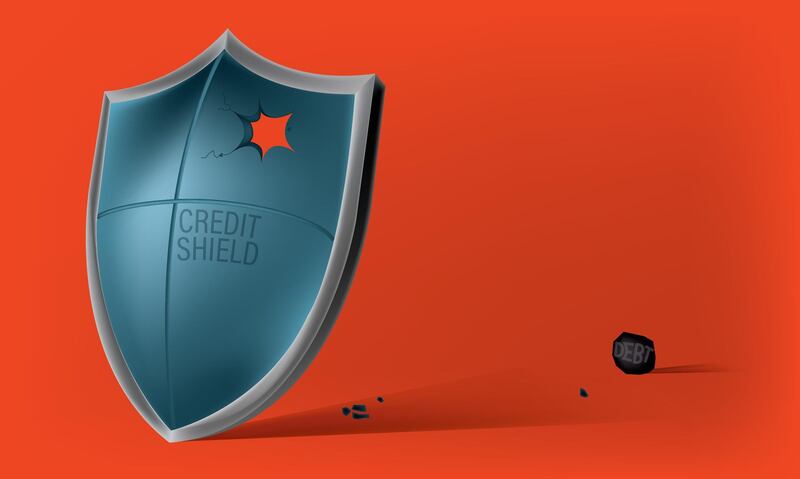I am in financial distress and struggling to pay my monthly obligations after being out of work for six months following redundancy. I finally secured a position in the hospitality industry on March 31 and was pleased I managed to pay some of my debts during my unemployment so that they did not spiral out of control. However, I did miss some payments.
After securing my job, I contacted the three banks to explain that my salary cannot sustain my monthly repayments. My outstanding debts are: outstanding balance / minimum payment due
Credit card 1: Dh48,017 (Dh15,067)
Credit card 2: Dh23,243 (Dh600)
Credit card 3: Dh12,600 (Dh525)
Personal loan: Dh8,222 (Dh400)
Total: Dh92,082 (Dh16,592)
Despite securing a new role, my new salary is less than half of my previous income — I earn Dh3,000 a month versus Dh6,500 before. I took the pay cut as it was the only offer I received after six months.
While the lenders for credit cards 2 and 3 and the personal loan agreed to restructure my payments, the bank for credit card 1 has been unwilling to renegotiate so far. Instead, they are squeezing me to pay the full amount I owe for the four months I missed payments. They are harassing me for a deadline, which is impossible because of my lower salary. This is despite me paying credit shield, which ranges from about Dh257 a month to Dh360, that I have not managed to claim on. The bank says I cannot make a claim because I was made redundant rather than being terminated.
I have tried negotiating with the credit collection department to have the repayment amounts lowered enough for me to afford but they say they cannot do anything.
I ran up the debts paying for treatment for my father who had liver cancer. He has now passed away but I still pay for my mother's diabetes medication. My accommodation, transport and food are covered by my employer and I send at least Dh600 back home every month. How can I resolve my financial issues? And can I make a claim on my credit shield cover? I really want to repay my dues but it has to be affordable. AE, Dubai
Debt panellist 1: Ambareen Musa, founder and chief executive of Souqalmal.com
One of the key benefits of credit shield is that it provides insurance coverage to repay your outstanding credit card balance in case of unexpected and involuntary unemployment. It is technically known as involuntary loss of employment (ILOE). However ILOE benefits can greatly vary from one credit card provider to another, not just in terms of benefits, but also in terms of limitations and exclusions.
While one bank may agree to cover 10 per cent of your outstanding credit card balance for a pre-specified period, another may also cover your utility bills during the covered period of unemployment. The maximum coverage period under ILOE benefits also varies from around six months in most cases to 12 months in others.
Credit shield products with ILOE benefits extend insurance benefits to those who have been laid off or made redundant unexpectedly and involuntarily. However, this coverage comes with its fair share of exclusions including dismissal as a result of employee misconduct, underperformance and exceeding your holiday allowance. Then there's a waiting period condition too stating that you can't claim ILOE benefits within 30 to 90 days of applying for credit shield coverage.
For exact details of the coverage you're eligible for, check the credit shield terms and conditions of your particular credit card product. Ask the bank for a copy of the benefits schedule under the credit shield insurance coverage you had originally signed up for. It would be a good idea to have a legal expert take a look at these benefits. Also lodge a formal complaint with the Central Bank of the UAE if you feel the card provider has unfairly denied you the due benefits under its credit shield coverage.
Debt panellist 2: Shaker Zainal, head of retail banking at CBI
The good news is that you have now a job. You should try to get a long-term personal loan to consolidate all your outstanding debts. The tenor needs to be long enough to make your monthly payments both serviceable and within the 50 per cent debt burden ratio required by the UAE regulations (this is calculated by dividing your total monthly loan payments to your monthly income).
You are, however, likely to encounter some challenges with your loan application. Most banks apply a minimum monthly income threshold of around Dh5,000. They might also be reluctant to give you a long-term loan, particularly because you have only recently found a new job and you will have some negative credit bureau records due to overdue payments in the past. Therefore, it would be helpful to lower your overall financing need, if possible, through selling off any liquid assets you might have either in your home country or here in the UAE or borrowing from friends or relatives.
There are a number of UAE financial comparison websites, which you might wish to explore. These websites will help you search for various loan offers of different banks and calculate your monthly payments, depending on different borrowing scenarios.
Consolidating all your outstanding liabilities into a single personal loan will also enable you to save significant interest costs, since more than 90 per cent of your loans are in credit cards, which tend to have much higher interest rates compared to personal loans.
You might want to consult with a legal counsel regarding your credit shield or the insurance company directly, if you had bought it from an insurance company. In general, your legal entitlements arising from a credit shield depend on the terms and conditions of the agreement you had signed with the insurer / provider. Carefully review your agreement and seek legal advice, if possible.
Debt panellist 3: Steve Cronin, founder of DeadSimpleSaving.com
Firstly, you need to maintain the communication with your banks and try to talk to the most senior person possible. The people who phone you up and hassle you have almost no authority to make decisions. Go to the branches or head office. Don't be afraid to report your lender to the Central Bank either for selling you a credit shield product which is effectively useless.
You need to start generating cash every month that can be used to pay off your debt rapidly. Be aware that this could mean a tough couple of years, but you will come through this stronger, more disciplined and more financially savvy. The priority is not to miss a payment, then to pay back the missed payments and then, if possible, to start paying back the balances rather than just making the minimum payments. To do this, you have to find ways to increase your income and reduce your expenses.
Talk to your boss or HR at work and explain your situation, making it clear that it wasn't your fault. Ask for more work, more responsibility or a pay rise if you achieve certain goals in the next six months. Meanwhile keep searching for a better paid job, either at the same company or with another company. Contact headhunters, ask friends, build your network on LinkedIn etc.
This is a grey area in Dubai, but try to get other work on your days off and evenings: helping at events or parties, helping your friends with whatever skills you have. Really think about what you have to offer, whether it is event management or book-keeping. Investigate opportunities to make money online with these skills through websites such as upwork.com or fiverr.com, even if it is for general administrative tasks. Promote yourself and work hard at every task you do.
You don't have many expenses fortunately, but see if you can reduce those you do have. Is there anyone who can help your mother back home, even to cover some of the expenses just for a few months? Is it possible for you to send less than Dh600 home? There is no point in sending too much if it means you lose your job and ability to stay in the UAE.
The Debt Panel is a weekly column to help readers tackle their debts more effectively. If you have a question for the panel, write to pf@thenational.ae









